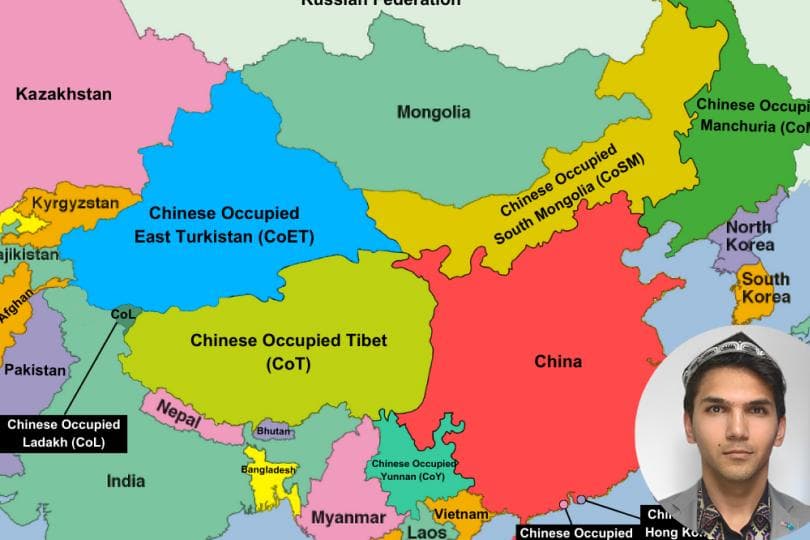Securing India's Future
The profound implications of the strategic necessity of supporting East Turkistan and Tibet's independence for regional stability, security and prosperity

In the current geopolitical landscape, marked by the echoes of historical injustices and the ambitions of expansionist China, India finds itself at a crucial juncture. Faced with China's aggressive territorial ambitions, the fight for freedom in East Turkistan and Tibet transcends regional issues, becoming crucial for safeguarding India's sovereignty and security. The Chinese occupation of Indian territories such as Eastern Ladakh ("Aksai Chin") and baseless claims over Arunachal Pradesh highlight the urgency for India to reassess its strategic imperatives. Supporting the independence of East Turkistan and Tibet has become not just a matter of external interest but a critical necessity for India's national security, economic prosperity, and the preservation of its rich cultural heritage.
A Historical and Cultural Imperative
India's historical connections with East Turkistan and Tibet are rooted in myriad cultural, economic, and spiritual exchanges that have developed over thousands of years. These enduring links have fostered profound mutual influences, particularly visible in the realms of religion, culture, and society. The transmission of Buddhism from India to East Turkistan and Tibet stands as a testament to this close relationship, representing not just an interchange of spiritual wisdom but also a cross-pollination of art, literature, and shared cultural values. This legacy is a vital aspect of the regions’ cultural identities, now facing the challenges of cultural assimilation and suppression.
For millennia, India, East Turkistan, and Tibet have engaged in a symbiotic relationship that has facilitated a vibrant exchange of goods, knowledge, and traditions, crafting the unique and complex cultural fabrics of each society. These historically rich interactions have been substantially impacted by the events following 1949, when the Chinese occupation and colonization of East Turkistan and Tibet began to reshape the landscape, imposing significant changes on these age-old connections.
Strategic Imperatives and Security Concerns
The necessity for India to support the independence movements of East Turkistan and Tibet is closely linked to its national security interests and regional stability. Contrary to common misconceptions, India has never shared a border with China throughout history. Instead, India shares borders with East Turkistan, occupied by China since 1949, and with Tibet since 1950. The direct threats posed by China's expansionist policies, evident in its occupation of East Turkistan, Tibet, and the Indian territory of Eastern Ladakh, along with repeated incursions into Indian territory and baseless claims over Arunachal Pradesh, render the independence of these regions a strategic imperative.
The historical buffer that an independent Tibet and East Turkistan provided between India and China has been compromised, drawing the Chinese military presence alarmingly close to Indian territory. Restoring these buffer zones is crucial for India’s strategic depth and defensive posture, ensuring peace and security along its borders. Such a move would also counterbalance China’s aggressive territorial ambitions, promoting a more stable regional and global environment.
Moreover, support for the independence of East Turkistan and Tibet extends beyond traditional security considerations. It reflects strategic foresight aimed at creating a sustainable, peaceful border environment and at reshaping both regional and global power dynamics towards stability and mutual respect. Such a stance by India would serve not only to correct historical wrongs but also to send a powerful message against unilateralism and expansionism. It highlights the significance of sovereign equality and territorial integrity, principles essential to international relations. India’s role in advocating for the independence of these colonized and occupied nations could inspire wider international support, contributing to a more equitable and just global order.
Economic Prospects and Connectivity
The economic significance of advocating for the restoration of independence to East Turkistan and Tibet is considerable for India and the broader region. Regaining independence for these occupied nations could open new trade routes and economic corridors, significantly boosting India's connectivity to Central Asia and beyond. This would diversify India's economic partnerships and lessen its dependence on traditional, congested trade paths. The shift is aimed not just at increasing trade volumes but at enhancing economic resilience and strategic autonomy in an interconnected world. Moreover, collaboration in sectors like food production, rare earth minerals, renewable energy, tourism, and technology could lead to innovation and sustainable development, benefiting not only India but the entire Central Asian and South Asian regions, and perhaps even the global community.
Crucially, East Turkistan is endowed with energy and mineral resources vital for India's growing economy, such as oil, natural gas, electricity, raw materials, and cotton. Access to these resources is a strategic opportunity for India to secure the essential inputs needed for its economic growth.
Furthermore, the environmental and water security implications of Tibet’s independence are profound for India and its neighbors. Tibet, often referred to as the "Third Pole," plays a crucial role as a water source for billions in Asia. Securing its independence from Chinese control—which has led to environmental degradation and unsustainable resource exploitation—is vital for the ecological health and water security of the region. With Tibet's independence, collaborative resource management, grounded in mutual respect and sustainability, would become feasible. This would not only protect crucial water supplies but also foster peace and cooperation in a region often marked by tensions over resource allocation.
Upholding Democratic Values and Human Rights
Supporting the independence of East Turkistan and Tibet resonates deeply with India’s historical struggle against colonization and its foundational values of democracy, human rights, and the rule of law. Championing the causes of East Turkistan and Tibet would demonstrate India’s steadfast commitment to the universal principles of freedom and external self-determination. This stance would send a powerful message of solidarity to those fighting for their rights under foreign occupation and colonization, embodying India’s role as a proponent of liberty and justice on the global stage. By advocating for the independence of occupied nations of East Turkistan and Tibet, India would not only cement its status as a leading democratic force in Asia but would also contribute significantly to the worldwide effort to safeguard human rights and foster democratic governance. Such a commitment is reflective of India’s vision for a global order predicated on respect, equality, and justice, where every nation and its people can prosper.
Moreover, supporting the independence of East Turkistan and Tibet is a stand against China's ongoing campaign of genocide and crimes against humanity against the Uyghur and other Turkic peoples in East Turkistan, as well as the Tibetan people. China's systematic efforts to suppress and eradicate the distinct cultural, religious, and linguistic identities of the Uyghurs in East Turkistan and the Tibetans in Tibet violate the tenets of international law and humanitarianism. India, with its diverse mosaic of cultures and traditions, recognizes the critical importance of preserving cultural heritage. By advocating for their independence, India could underscore the right of all peoples to maintain their cultural identity and live freely, reinforcing India’s moral leadership and its commitment to fostering a more inclusive and respectful international community. This position not only upholds India's values but also champions a broader respect for human rights, democracy, and freedom globally.
A Call to Leadership
The imperative for India to support the independence of East Turkistan and Tibet is a multifaceted call to action that encompasses historical, strategic, economic, and moral dimensions. This support transcends geopolitical calculations, embodying a commitment to freedom, peace, and justice on a global scale. India, by championing these causes, not only secures its own interests but also asserts its leadership in shaping a more equitable and stable world order. The time is now for India to stand in solidarity with East Turkistan and Tibet, affirming their right to regain their independence and restore their place in the community of free and independent nations. Such a stance would not only reflect India’s strategic acumen and moral courage but also its vision for a future where all nations can coexist in peace and mutual respect.



































